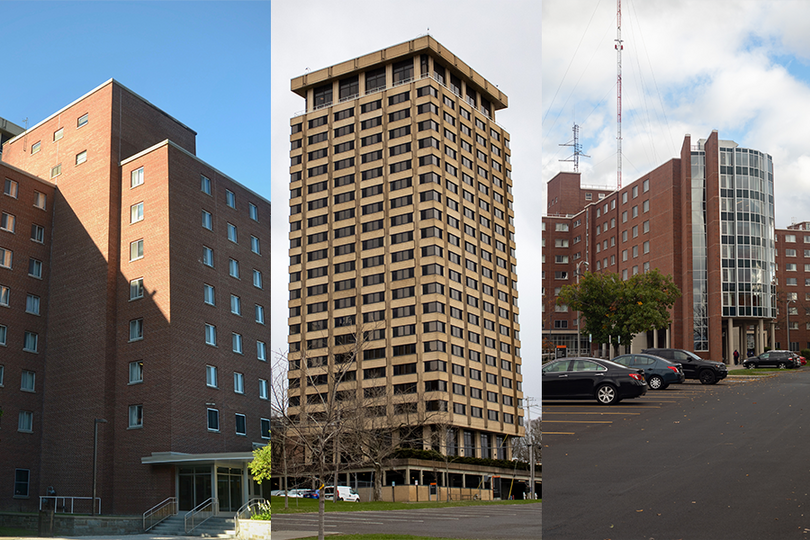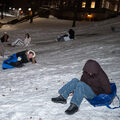RAs say SU support falls short amid high stress, expectations

Many Resident Advisors at Syracuse University say the job comes with pressure, little institutional support and burnout. RAs are “at the heart” of the living experience, supporting students and residents through difficult transitions. Emily Steinberger | Daily Orange File Photo, Leonardo Eriman | Photo Editor, Joe Zhao | Senior Staff Photographer
Get the latest Syracuse news delivered right to your inbox.
Subscribe to our newsletter here.
Ellen Clark became a resident advisor to honor her sophomore year RA, who once helped her feel at home. When it was Clark’s turn to guide her residents, however, she said she found herself navigating the job’s pressures with little support from Syracuse University.
Clark, a graduating senior double majoring in citizenship & civic engagement and political philosophy, was inspired to become an RA after her own died at the beginning of her sophomore year. After arriving at SU in spring 2022 as a Discovery Program student, she said she struggled to feel connected on campus.
“He was really wonderful my sophomore year,” Clark said. “It just felt like another way to commemorate him. I wanted to be that kind of support for someone else.”
But Clark said her transition into the role wasn’t smooth. She was pulled off the waitlist to become an RA mid-sophomore year, moving from Haven Hall to Lawrinson Hall. The change was abrupt, with minimal support provided to ease the move, she said.
Instead, Clark found herself relying on other RAs more than the university. The informal support network became her main source of guidance, she said. And Clark isn’t alone — many RAs said the job comes with pressure, burnout and little institutional support.
Leana Bashar, a senior studying environmental geoscience, was also a mid-year hire. She said she would’ve struggled to transition without the community she found among fellow RAs in Lawrinson Hall. Bashar credited her Lawrinson RA group chat as a “lifesaver.”
RA responsibilities differ depending on the building and floor, Clark said. According to SU’s website, RAs are “at the heart” of the living experience, acting as leaders within their communities and offering residents support, referrals and opportunities for connection.
Bashar said she became an RA after her freshman-year RA made her feel welcome during a difficult transition to college life, along with wanting the free housing that comes with the position.
But, she didn’t anticipate how deeply personal the role would become.
She described the job as “unorthodox” because students live where they work. She said the role can be inconsistent as she has varying responsibilities, but is always tasked with offering constant support to residents.
RAs track “intentional interactions,” documenting time spent with residents to show they’re actively connecting with their floor, and do so every few months to track residents’ well-being.
The internal structure of Student Living creates challenges, as RAs report to Resident Directors, who report to Assistant Directors and then up to the Student Living office, Clark said.
During the semester, RD meetings occurred every other week, but didn’t feel relevant, Clark said. Meetings didn’t discuss what was happening on the floors or the job itself, she said.
Clark recalled being told directly by Student Living leadership that RAs were “replaceable,” and claimed their stipends could be reduced or revoked for underperformance and non-compliance.
“It feels like we’re kind of trapped in that ‘we’re replaceable’ and they’ll keep our money if we don’t act right,” Clark said. “It was not a great experience to have the leadership do and say things like that.”
In a statement to The Daily Orange, a university spokesperson said the university views its staff and student leaders as “valued members of its community.”
“Our goal is to foster a departmental culture that respects and supports each individual and that is both sustainable and responsive to the needs of every team member,” the spokesperson said.
A current RA in Day Hall, who asked to remain anonymous as they’ll be an RA for another year, shared similar frustrations. They described the university’s support as largely “performative,” limited to surface-level gestures. When serious issues arise, they said, RAs are often left to manage on their own with little to no support.
While trying to get assistance from Student Living during a student crisis, the Day RA said they received vague instructions and delayed responses. They added that in some situations, bringing in university staff escalated tension instead of resolving it.
“There’s not enough clarity around when we’re supposed to act and when we should escalate,” they said. “So we end up doing everything ourselves, which isn’t sustainable for the long run.”
Clark said she was uncomfortable being asked to engage with residents accused of serious misconduct, including bias-related incidents and sexual assault. Student Living directs RAs to confront accused perpetrators, Clark said.
“You shouldn’t be asking RAs, especially women, to have direct conversations with people accused of sexual assault,” Clark said. “I don’t want to be put in that position, where I feel unsafe.”
A RA in Sadler Hall, who also asked to be kept anonymous, said their experience has been positive overall, but acknowledged that the job’s emotional load can catch people off guard, calling for more structured support from the university.
The Sadler RA said mental health support for RAs after difficult incidents is “virtually nonexistent.”
“There should be built-in counseling or at least a space to talk about what we’re going through,” the Sadler RA said. “Instead, we’re just expected to move on.”
The university spokesperson wrote that Student Living collaborates with the Barnes Center and Student Outreach and Support in responding to mental health emergencies. The statement also said staff review daily incidents, and DPS identifies and supports any impacted RAs.
The SU spokesperson said a new initiative is launching in the 2025-2026 academic year to create a “formal space for raising concerns and collaboratively developing solutions” through monthly meetings between RAs and senior leadership. They also outlined several formal reporting options for RAs seeking support, including reporting to RDs, ADs and senior leadership.
The Sadler RA said that while being an RA has helped them develop skills in conflict management, communication and leadership, it hasn’t come without challenges. There are moments when the university seems to forget RAs are students too, they said.
Several RAs said the job has helped them grow personally and professionally, but said the structure often feels slow and disconnected. Bashar described a gap between the day-to-day expectations and the pace at which institutional decisions are made.
“It really feels like a bureaucracy, in a way,” Bashar said. “You’re waiting around for things to get approved or rejected, and in the meantime, it’s just you on the front.”
Bashar said the pressure of the position also bleeds into her social life. She said it’s difficult to maintain friendships, both with residents, where boundaries are tricky, and with friends outside the dorm.
Clark said her social circle shrank significantly after taking on the role.
“It leaves a lot to be desired, especially because you’re living with freshmen,” Clark said. “You’re not with your friends anymore.”
Their experiences echo broader concerns among RAs at SU. A 2022 survey conducted by The D.O. found that RAs expressed feelings of being overwhelmed and overworked, citing inadequate support from Student Living during crises.
In 2020, RAs demanded hazard pay and more personal protective equipment, highlighting the additional responsibilities placed on them during the pandemic, which they said the university failed to acknowledge.
RAs receive a week-long “comprehensive” training session each August along with ongoing support throughout the academic year, focusing on “preparedness for student crises” and mental health emergencies, the spokesperson wrote in the statement.
If inappropriate comments are reported, the spokesperson said the issue would be addressed with a “confidential, educational conversation” focusing on accountability and growth.
The SU spokesperson added that the university is exploring strategies to incorporate recovery into the job, acknowledging the emotional toll the position can take on students who are “constantly exposed to others’ trauma.”
Despite her qualms with the Student Living office and the difficulties of being an RA, Clark called the role “rewarding” for the experience of creating connections with the residents on her floor.
“You really get to know a lot of kids that are really bright and fun and are excited to be here,” Clark said. “That part is wonderful.”
The Sadler RA hopes residents remember her floor as “a place where they felt heard,” but also said they want to see institutional change. They emphasized that RAs shouldn’t be treated as unpaid laborers or informal counselors, and that the university needs to build in more resources.
They said the job has made them “more patient and more self-aware,” and taught them how to listen deeply and respond thoughtfully. The Day RA, however, said while good things can come from the role, proper growth can only come from more university support and resources.
“The role has a lot of potential for personal and professional growth,” the Day RA said. “But that only happens if we’re given the right resources, like consistent support from supervisors, and proper protocols for tough situations.”






